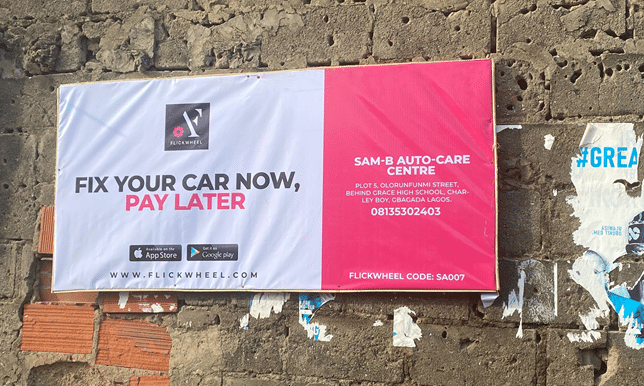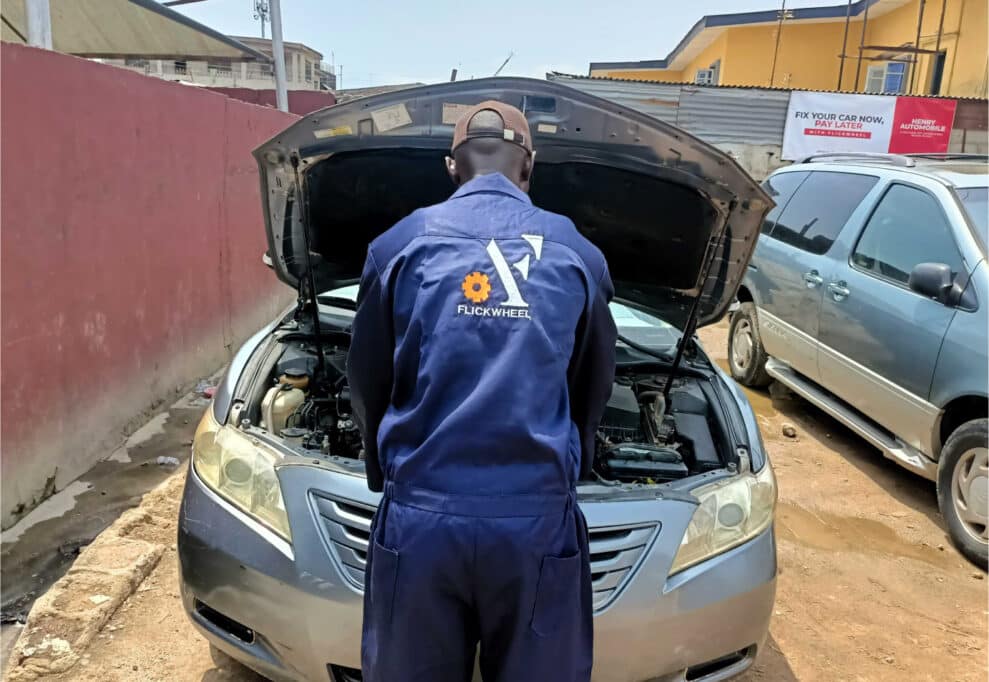According to the National Bureau of Statistics, there are more than 12 million vehicles in Nigeria, with used cars, popularly called Tokunbo, constituting more than 90% of this figure.
Vehicle owners in Nigeria face a myriad of challenges, including difficulty finding reliable mechanics, high upfront costs for car repairs, limited car maintenance knowledge, and inefficient repair processes.
These issues lead to frustration, wasted time, and financial losses, but Flickwheel, a three-year-old startup, hopes to provide a solution to these long-standing problems and ensure that car owners can get back on the road quickly and affordably.
In 2019, Paul Edward got a ₦25,000 loan request from a friend, an Uber driver, who needed some money to fix his car. To provide some guarantee for the loaned funds, he connected the friend with a vehicle mechanic. That friend repaid the loan, but Edward started getting more requests. Although he sensed there was an opportunity there, he needed to be certain that it was financially viable before committing to building a mobile app.
A software developer, he had tried his hand at building a startup — Tailor at Hand — but dropped it after he and his co-founder failed to raise capital to meet customers’ demands. Over the next six months, he managed this side hustle using an Excel sheet.
With each vehicle maintenance that he financed, he got more referrals, but the COVID-19-influenced lockdowns forced him to pause the service.
After the lockdown, he decided it was time to build a mobile app and business around it, but first, he needed a team.
He called on Henry Okafor, a product designer whom he had worked with at Parkway Projects, but Okafor was not initially keen.
A year later, he would have some car trouble, and Edward provided him with the funds to fix it, but not without reminding him that this was the same solution he had pitched 12 months earlier.
Seeing how helpful it could be, Okafor signed up, and Edward brought on the third member of the team, Steve Amire, who had worked with him to build Tailor at Hand.
They had to rely on their own funds to cover the requests they received after 200 people signed up on the first day of the launch, so they struggled to meet demand. Attempts to get funding from financial institutions were largely unsuccessful, and when they finally got a ₦10 million facility, they exhausted it in two weeks.
Fix-now-pay-later

Access to qualified vehicle technicians is a common challenge for many vehicle owners in Nigeria. Traditionally, that need has been filled by roadside mechanics, but that has its drawbacks.
Without a standard training curriculum, the skill level of auto mechanics varies, and finding a competent mechanic requires some luck. Additionally, car owners face the prospect of seeing car troubles worsen due to theft or malicious actions by mechanics.
With a market value of over $7 billion, startups are turning their eyes to this market with players like Mecho Autotech, Fixit45, and Cardio Autotech.
Flickwheel’s competitors have typically focused on solving these problems by connecting vehicle owners to mechanics.
However, Okafor believes Flickwheel’s decision to focus on providing financing for vehicle repairs and maintenance sets them apart. Users can unlock financing in less than 24 hours and have a repayment period of up to four months with interest rates between 8% and 24%.
This guarantees their cars are fixed quickly but also assures the mechanics that they get paid immediately after the job is completed.
For Samuel, an auto mechanic who has been a customer for more than a year, Flickwheel’s solutions ensure he’s able to make more money as customers don’t have to wait until they have the funds to fix their cars. He’s also recommending the startup to his customers who are unable to pay for their vehicle repairs.
“I don’t know any other mechanics they’ve been using, but on my own end, I love it. Most of the cars I’ve worked on them with, those people have been coming back to me and like ‘thank God say dem even give them beta mechanic.’”
So far, the startup says its default rate is less than 5%, while it has provided financing for 200 vehicles.
Flickwheel charges a service fee of ₦10,000 for users who need financing. For users who can afford the cost of fixing their cars but want to use its pool of vetted technicians, the startup charges 20% of the value of the repair.
That model appears to be working for the startup. It has financed repairs valued at more than ₦30 million since it launched. But it’s not stopping there. This year, it launched the beta version of a subscription service that covers preventive maintenance, including vehicle renewals, and roadside assistance, which Edward says is oversubscribed. Subscriptions start from ₦10,000 and could go as high as ₦25,000 depending on the vehicle.
Marketplace business models can be tricky. Users on both sides often attempt to bypass the middleman to save on the commissions they charge. Flickwheel guards against this with a closed marketplace that can only be accessed by users with a subscription.
While not foolproof, when paired with the low subscription fees, it reduces the chances that users go over their heads to interface with the mechanics.
In addition to individual users, Flickwheel is in talks to maintain cars for large fleets, while its technology can be used by car insurance providers for claims assessment. It’s also building a portal for users to verify their vehicle history and charges ₦5,000 per vehicle.
Investing in quality service

A common complaint about Nigeria’s blue-collar workers is how unreliable they can be, and Okafor points out that many factors influence their inability to deliver professional services, including having too much on their plate, poor work ethic, and not having the right tools.
Part of Flickwheel’s solution is regular updates during repairs that can be done using the mobile app. This feature allows customers to know the state of the repairs being done on their car.
While it recognises that access to trained technicians is a major challenge, it has taken a different approach.
“When we launched with our fix-now-pay-later [service], we allowed our users to add their own technicians, which now allowed us to build out a database of auto technicians across several departments. Over the next few months, we started partnering with some of them that we had worked with to now build out 30 auto workshops that we consider vetted auto workshops,” Okafor shares.
While most of the workshops were recommended by users, it remains focused on building a quality assurance system. On its mobile app, customers can rate the quality of service they receive. And though the mechanics are currently unable to view it, that would change once it launches a dedicated app for mechanics.
“Our goal is actually to be able to build a scalable quality assurance system with these technicians, and the scalability is important because once you’re able to work with this and you can scale it, we can now start working at expanding it to other technicians,” Edward shares.
Flickwheel also plans to invest in their skills by providing financing that allows them to invest in tools and skills while they get to pay over three years. With funding a major component of its operation, the startup, which was part of the first cohort of the Accelerate Africa accelerator, is currently raising $2 million in debt and equity.










